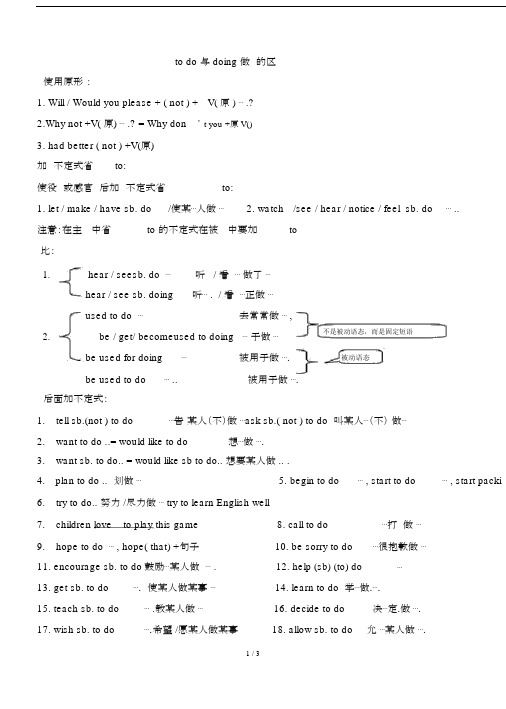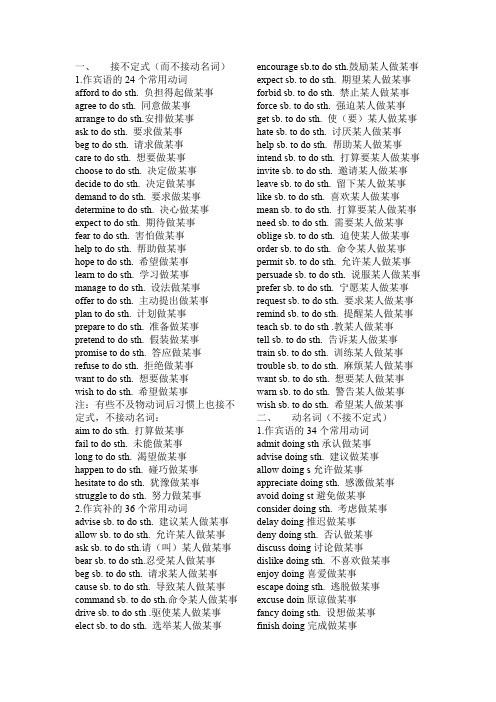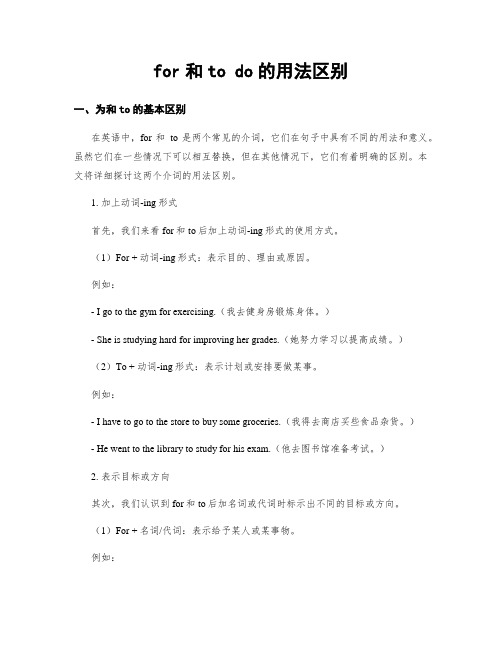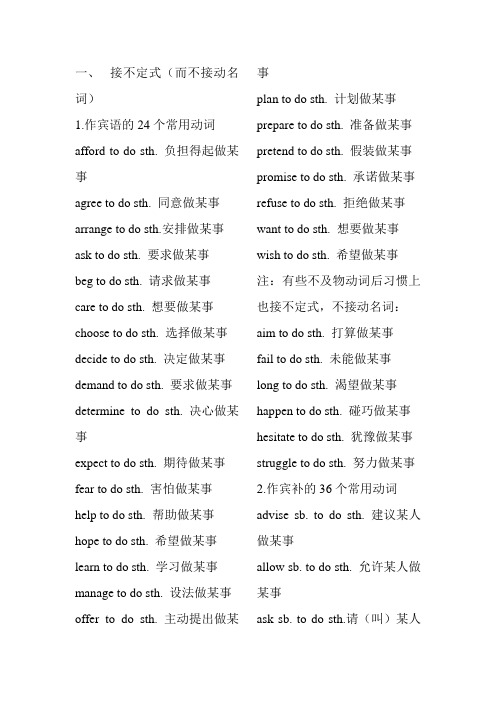【尚友制造】[GMAT语法] To do和For doing的区别
to__do__与doing做宾语的区别总结

to__do__与doing做宾语的区别总结to do 与doing 做宾语的区别总结动词使⽤原形:1. Will / Would you please + ( not ) + V(原)….?2.Why not +V(原)….? = Why don’t you + V(原)3. had better ( not ) +V(原)加动词不定式省to :使役动词或感官动词后加动词不定式省to:1. let / make / have sb. do…让/使某⼈做…2. watch /see / hear / notice / feel sb. do ….. 注意:在主动语态中省to 的不定式在被动语态中要加to对⽐:1.hear / see sb. do…听见 / 看见…做了…hear / see sb. doing…. 听见 / 看见…正做…used to do… 过去常常做2. be / get/ become used to doing …习惯于做be used for doing… 被⽤于做….be used to do ….. 被⽤于做….动词后⾯加不定式:1. tell sb.(not ) to do… 告诉某⼈(不)做… ask sb.( not ) to do…叫某⼈(不)做…2. want to do ..= would like to do … 想做….3. want sb. to do.. = would like sb to do.. 想要某⼈做.. .4. plan to do .. 计划做…5. begin to do…, start to do…, start packing6. try to do.. 努⼒/尽⼒做… try to learn English well7. children love to play this game 8. call to do … 打电话做…9. hope to do… , hope( that) +句⼦ 10. be sorry to do… 很抱歉做…11. encourage sb. to do … ⿎励某⼈做 …. 12. help (sb) (to) do…13. get sb. to do…. 使某⼈做某事… 14. learn to do….学做….15. teach sb. to do…. 教某⼈做… 16. decide to do …. 决定做….17. wish sb. to do …. 希望/愿某⼈做某事 18. allow sb. to do…允许某⼈做….19. warn sb. not to do… 警告某⼈不要做… 20. deserve to do.. 注定做…21. (can’t) afford to do…(不能)负担得起做…22.can’t wait to do…迫不及待做..23. seem to do …似乎要做… 24. be to do … 将要做…25. refuse to do…. 拒绝做….. 26. agree to do…..同意做…..27. expect to do…. 期望做…. 28. expect sb. to do ….期望某⼈做……29. set one’s mind to do…. ⼀⼼想做某事30. make up one’s mind to do….下定决⼼做某事31. prefer to do …… rather than do…..宁愿做…⽽不做…32. It takes sb. some time to do sth. 花某⼈多长时间做某事33. It’s + adj. + (for sb. ) to do ….. (对于某⼈)做某事adj.34. sb. finds it … to do….. 某⼈发现做某事…..35. It’s better / best ( for sb.) to do… 较好/最好做….接动名词:1. enjoy doing…, enjoy oneself2. finish doing…3. hate doing… 讨厌做….4. be good at sth. = do well in sth.be good at doing …= do well in doing…..5. what / how about doing…?6. thank sb. for doing….感谢某⼈做….7. have fun doing… 做…有乐趣8. have problems / difficult doing…做……有困难/问题9. give up doing….放弃做… 10. take part in doing…. (积极)参加做….11. make a contribution to doing….12. practise doing… 13. be worth doing… 值得做…14. feel like doing…. 想要做…. 15. be interested in doing…16. by doing… 通过,以…. 17. the way of doing….做….的⽅法18. keep doing…⼀直做… 19. keep sb. doing…让某⼈⼀直做…keep on doing …反复做….20. succeed in doing…成功做某事21. be busy doing….22. spend ….(in) doing….花时间/钱做…23. can’t help doing …. 禁不住/ 情不⾃禁做某事24. instead of doing….. 代替做某事25. prefer doing …. to doing…宁愿做…⽽不是做… ; 较喜欢做…⽽不是做….20. keep / stop / prevent sb. from doing….. 阻⽌某⼈做某事19. mind (sb. / one’s)doing … 介意(某⼈)做….既可加不定式,⼜可加动名词, 但有区别:1.like doing… 表⽰⼀般情况like to do.. 喜欢/愿意做…表⽰具体谋⼀次情况2. remember to do…记得要做…3. forget to do… 忘记要做…remember doing….记得做过…. forget doing…. 忘记做过…4. stop to do…停下来做..(另⼀件事)stop doing…停⽌做….. 6. be afraid to do…不敢做…;害怕做…;5. go on to do… 继续做另⼀件事be afraid of sth. 害怕某物go on doing…. 继续做同⼀件事be afraid of doing…害怕做…7. need to do….. 需要做…..need doing ……(某物/⼈) 需要被….。
(完整版)to__do__与doing做宾语的区别总结.docx

to do 与 doing 做的区使用原形:1. Will / Would you please + ( not ) +V( 原 ) ⋯ .?2.Why not +V( 原) ⋯ .? = Why don’ t you +原V()3. had better ( not ) +V(原)加不定式省to:使役或感官后加不定式省to:1. let / make / have sb. do/使某⋯人做⋯2. watch /see / hear / notice / feel sb. do⋯..注意:在主中省to 的不定式在被中要加to比:1.hear / seesb. do⋯听 / 看⋯做了⋯hear / see sb. doing听⋯. / 看⋯正做⋯used to do ⋯去常常做⋯ ,2.be / get/ becomeused to doing ⋯ 于做⋯be used for doing⋯被用于做⋯.be used to do⋯ ..被用于做⋯.不是被动语态,而是固定短语被动语态后面加不定式:1.tell sb.(not ) to do⋯告某人(不)做⋯ask sb.( not ) to do 叫某人⋯(不)做⋯2.want to do ..= would like to do想⋯做⋯.3.want sb. to do.. = would like sb to do.. 想要某人做 .. .4. plan to do .. 划做⋯5. begin to do⋯, start to do⋯, start packi6.try to do.. 努力 /尽力做⋯ try to learn English well7.children love to play this game8. call to do⋯打做⋯9.hope to do ⋯ , hope( that) +句子10. be sorry to do⋯很抱歉做⋯11. encourage sb. to do鼓励⋯某人做⋯ .12. help (sb) (to) do⋯13. get sb. to do⋯. 使某人做某事⋯14. learn to do 学⋯做.⋯.15. teach sb. to do⋯ .教某人做⋯16. decide to do决⋯定.做⋯.17. wish sb. to do⋯.希望 /愿某人做某事18. allow sb. to do允⋯某人做⋯.19. warn sb. not to do警⋯告某人不要做⋯20. deserve to do.. 注定做⋯21. (can ’ t) afford to do (不能⋯)担得起做⋯22.can ’ t wait to do迫不及⋯待做 ..23. seem to do⋯似乎要做⋯24. be to do将⋯要做⋯25. refuse to do⋯ .拒做⋯ ..26. agree to do同⋯意..做⋯ ..27. expect to do⋯ .期望做⋯ .28. expect sb. to do 期望⋯某.人做⋯⋯29. set one ’ s mind to do ⋯ .一心想做某事30. make up one’ s mind to do⋯下.定决心做某事31.prefer to do ⋯⋯ rather thando⋯ ..宁愿做⋯而不做⋯32.It takes sb. some time to do sth. 花某人多做某事33. It ’ s + adj. + (for sb. ) to do .(⋯于.某人)做某事adj.34. sb. finds it⋯ to do⋯ ..某人做某事⋯ ..35. It ’ s better / best ( for sb.) to do好 /最⋯好做⋯.接名:1. enjoy doing⋯ , enjoy oneself2. finish doing⋯3. hate doing⋯做⋯.4. be good at sth. = do well in sth.be good at doing⋯ = do well in doing⋯..5. what / how about doing⋯ ?6. thank sb. for doing⋯. 感某人做⋯.7. have fun doing⋯做⋯有趣8. have problems / difficult doing 做⋯⋯⋯有困 / 9. give up doing⋯. 放弃做⋯10. take part in doing⋯(.极)参加做⋯.11. make a contribution to doing⋯ .12. practise doing⋯13. be worth doing⋯得做⋯14. feel like doing⋯ .想要做⋯ .15. be interested in doing⋯16. by doing⋯通,以⋯.17. the way of doing⋯. 做⋯.的方法18. keep doing⋯一直做⋯19. keep sb. doing⋯某人一直做⋯keep on doing⋯反复做⋯.20. succeed in doing⋯成功做某事21. be busy doing⋯ .22. spend ⋯ .(in) doing花⋯ . /做⋯23. can ’ t help doing禁⋯不.住 / 情不自禁做某事24. instead of doing⋯代..替做某事25. prefer doing⋯ . to doing ⋯宁愿做⋯而不是做⋯ ;喜做⋯而不是做⋯.20. keep / stop / prevent sb. from doing阻止某人⋯做..某事19. mind (sb. / one )doing’s ⋯介意 (某人 )做⋯ .既可加不定式 ,又可加名 , 但有区 :1.like doing⋯表示一般情况like to do..喜 /愿意做⋯表示具体一次情况2.remember to do⋯得要做⋯3. forget to do⋯忘要做⋯remember doing ⋯. 得做⋯ .forget doing⋯ . 忘做⋯4. stop to do⋯停下来做 ..(另一件事 )stop doing⋯停止做⋯ .. 6. be afraid to do不⋯敢做⋯;害怕做⋯ ;5. go on to do⋯做另一件事be afraid of sth.害怕某物go on doing⋯ .做同一件事be afraid of doing害⋯怕做⋯7. need to do⋯ ..需要做⋯ ..need doing⋯⋯ (某物 / 人) 需要被⋯.。
to do 和doing的区别做主语

to do 和doing的区别做主语
以“To-Do和Doing的区别”为题,本文将从定义上、思维模式上和实践上,探讨To-DoDoing的不同,并以此来揭示它们的重要性。
首先,定义上的不同。
To-Do是指要完成的事情列表,通常包括一系列要完成的任务,或分配给某人或某公司的任务。
Doing则指正在进行中或已经完成的工作、活动、任务或事件。
其次,思维模式上的不同。
To-Do是一种前瞻性思维,它是规划和安排将来要完成的事情的过程,可以帮助我们在有限的时间内实现更多的目标。
Doing则是一种行动性思维,它是实际去完成事情的过程,可以帮助我们获得成绩。
最后,实践上的不同。
To-Do强调的是未来的规划,从而将所有要完成的任务都列在一个列表中,以便把握任务的进度。
Doing 则强调现在的行动,这意味着必须把这些任务一一完成,以便把事情做好。
从上述内容来看,To-Do和Doing都是不同的思维模式,它们都是实现任务和目标的重要因素。
计划是实现目标的基础,而行动才能实现计划,因此计划和行动是相辅相成的,不可分割。
在职场中,先进行规划再进行行动的做法,可以节省大量的时间和精力,帮助我们完成更多的任务。
因此,我们应该在工作中采用To-Do和Doing的结合,充分发挥这两种思维模式的优势,以期获得更好的成绩。
综上所述,To-Do和Doing在定义上、思维模式上和实践上都有着本质的不同,它们在实现目标中都扮演着重要的角色,因此我们应该学会采用To-Do和Doing的结合,以期取得更好的成果。
动词to-do-与doing-的用法区别

一、接不定式(而不接动名词)1.作宾语的24个常用动词afford to do sth. 负担得起做某事agree to do sth. 同意做某事arrange to do sth.安排做某事ask to do sth. 要求做某事beg to do sth. 请求做某事care to do sth. 想要做某事choose to do sth. 决定做某事decide to do sth. 决定做某事demand to do sth. 要求做某事determine to do sth. 决心做某事expect to do sth. 期待做某事fear to do sth. 害怕做某事help to do sth. 帮助做某事hope to do sth. 希望做某事learn to do sth. 学习做某事manage to do sth. 设法做某事offer to do sth. 主动提出做某事plan to do sth. 计划做某事prepare to do sth. 准备做某事pretend to do sth. 假装做某事promise to do sth. 答应做某事refuse to do sth. 拒绝做某事want to do sth. 想要做某事wish to do sth. 希望做某事注:有些不及物动词后习惯上也接不定式,不接动名词:aim to do sth. 打算做某事fail to do sth. 未能做某事long to do sth. 渴望做某事happen to do sth. 碰巧做某事hesitate to do sth. 犹豫做某事struggle to do sth. 努力做某事2.作宾补的36个常用动词advise sb. to do sth. 建议某人做某事allow sb. to do sth. 允许某人做某事ask sb. to do sth.请(叫)某人做某事bear sb. to do sth.忍受某人做某事beg sb. to do sth. 请求某人做某事cause sb. to do sth. 导致某人做某事command sb. to do sth.命令某人做某事drive sb. to do sth .驱使某人做某事elect sb. to do sth. 选举某人做某事encourage sb.to do sth.鼓励某人做某事expect sb. to do sth. 期望某人做某事forbid sb. to do sth. 禁止某人做某事force sb. to do sth. 强迫某人做某事get sb. to do sth. 使(要)某人做某事hate sb. to do sth. 讨厌某人做某事help sb. to do sth. 帮助某人做某事intend sb. to do sth. 打算要某人做某事invite sb. to do sth. 邀请某人做某事leave sb. to do sth. 留下某人做某事like sb. to do sth. 喜欢某人做某事mean sb. to do sth. 打算要某人做某事need sb. to do sth. 需要某人做某事oblige sb. to do sth. 迫使某人做某事order sb. to do sth. 命令某人做某事permit sb. to do sth. 允许某人做某事persuade sb. to do sth. 说服某人做某事prefer sb. to do sth. 宁愿某人做某事request sb. to do sth. 要求某人做某事remind sb. to do sth. 提醒某人做某事teach sb. to do sth .教某人做某事tell sb. to do sth. 告诉某人做某事train sb. to do sth. 训练某人做某事trouble sb. to do sth. 麻烦某人做某事want sb. to do sth. 想要某人做某事warn sb. to do sth. 警告某人做某事wish sb. to do sth. 希望某人做某事二、动名词(不接不定式)1.作宾语的34个常用动词admit doing sth承认做某事advise doing sth. 建议做某事allow doing s允许做某事appreciate doing sth. 感激做某事avoid doing st避免做某事consider doing sth. 考虑做某事delay doing推迟做某事deny doing sth. 否认做某事discuss doing讨论做某事dislike doing sth. 不喜欢做某事enjoy doing喜爱做某事escape doing sth. 逃脱做某事excuse doin原谅做某事fancy doing sth. 设想做某事finish doing完成做某事给大家推荐一个英语微信群-Empty Your Cup英语微信群是目前学习英语最有效的方法,群里都是说英语,没有半个中文,而且规则非常严格,是一个超级不错的英语学习环境,群里有好多英语超好的超牛逼的人,还有鬼佬和外国美眉。
to do与for doing用法

“for + doing”表示“东西”的“用途”;而“to do”表示某个“动作”的“目的”。
比如:
This knife is for cutting meat.
这把刀的用途是切肉的。
“刀”是“东西”。
“切肉”是“用途”。
所以这里要说 for cutting meat 而不能说 to cut meat。
再来个例子:
这台电脑的用途是储存档案的。
This computer is for storing files.
而不定式“to do”是用来表示某个动作的目的。
比如:
I will fly to Beijing to attend a very important meeting.我将会飞到北京参加一个重要的会议。
“飞到北京”是个动作,
“参加会议”是目的,
所以要用 to attend a very important meeting,而不能说 for attending a very important meeting。
再如:
I bring you a gift to celebrate your birthday.
我给你带来一份礼物来庆祝你的生日。
所以,我再把原则讲一遍,请大家以后根据这个模式选择正确说法:
for + doing 表示“东西”的“用途”;而to do 表示某个“动作”的“目的”。
动词todo和doing的用法区别教学提纲

learn to do sth.学习做某事
man age to do sth.设法做某
事
offer to do sth.主动提出做 某事
plan to do sth.计划做某事
prepare to do sth.准备做某
努力做某
en courage sb. to do sth.鼓
事
励某人做某事
2.作宾补的36个常用动词
expect sb. to do sth.
期望某
advise sb. to do sth
.建议某
人做某事
人做某事
forbid sb. to do sth.
禁止某
allow sb. to do sth.
事
prete nd to do sth.假装做某
事
promise to do sth.承诺做某
事
refuse to do sth.拒绝做某事want to do sth.想要做某事
wish to do sth.希望做某事
注:有些不及物动词后习惯上 也接不定式,不接动名词:aim to do sth.打算做某事
允许某
人做某事
人做某事
force sb. to do sth.
强迫某
ask sb. to do sth.
请(叫)某
人做某事
人做某事
get sb. to do sth.
使(要)
bear sb. to do sth.
忍受某人
某人做某事
做某事
hate sb. to do sth.
讨厌某人
beg sb. to do sth.
to do 与 doing 区别

(一)动词不定式:动词不定式由“to+ 动词原形”构成,如:to study, to play,动词不定式虽然不能作谓语动词用,但仍留着动词的特征,它可以带有所需要的宾语或状语而构成动词不定式短语,如:to study hard, to play table tennis。
1、动词不定式的形式变化:动词不定式有下列时态和语态的形式变化。
语态式一般式完成式进行式完成进行式主动to build to have built to be building to have been building被动to be build to have been build2、动词不定式的基本用法:动词不定式能起名词、形容词和副词的作用,可在句中作主语、表语、宾语补足语、定语和状语用,如:(1)作主语:To help each other is good.(动词不定式作主语时,一般可用it作形式主语,而将作主语的动词不定式置于句末,如:It is good to help each other.(2)作表语:My job is to drive them to the power station every day. 动词不定式在系动词be之后作表语,与表示将来时的be + 动词不定式结构有所区别,如:Our plan is to set up another middle school for the peasants’ children.我们的计划是给农民子弟再成立一所中学。
(句中的谓语动词为is,动词不定式to set up… 为表语,主语为plan,但plan并不是动词不定式的逻辑主语,即动词不定式to set up所表示的动作不是主语plan产生的。
)We are to set up another middle school for the peasants’ children.我们将为农民的子弟再成立一所中学。
GMAT语法固定搭配的用法小结

GMAT入门的考生要首先做一个全面的了解,这样语法备考才会更加的顺利。
GMAT 语法中,经常出现很多固定搭配。
今天我们就说一下GMAT语法固定搭配的用法,希望大家顺利备考GMAT语法考试。
1)to do 与 doing 的区别表示动作的目的最好用to do,如construct sth. to do sth.。
*: for doing是指某事物的具体用途,而to do 则有目的的意思,但用途和目的本来就有交叉的地方,所以没有绝对规则for doing有持久性的趋势,而to do往往是一次性行为2)because/as/since/for 在引导原因状语从句时的区别其他条件都满足的情况下,一般表示原因用because,当后面的原因是推测的时候用for最合适,当后面的原因是大家看到就知道(顺其自然)时用as/since最合适。
3)reach 的固定搭配reach for sth.伸手抓某物reach of sb.在某人能触及到的范围内put within/in the reach of…… 放到某人触手可及的地方4)Allow 固定搭配allow that承认allow for考虑到, 允许allow sb. to do sth.允许;allow sth. to be done也是对的;allow + sb. + 动作性名词错5)Prohibit 固定搭配prohibit sth;prohibit from doing;prohibit sb from doing6)Indicate 固定搭配Indicate (to sb) somethingIndicate that……..7)Presume 固定搭配presume的固定搭配,表示假设的时候就这三种用法:1、presume that…….I presume we'll be there by six o'clock.2、presume somebody/something to be somebody/something (被动即sth. presumed to be)From the way he talked, I presumed him to be your boss.3、be presumed to do somethingThe temple is presumed to date from the first century BC.关于GMAT语法固定搭配的用法的内容我们就介绍这么多,希望考生能够掌握,通过不断练习了解GMAT语法考试备考经验,顺利备考GMAT考试。
for和to do的用法区别

for和to do的用法区别一、为和to的基本区别在英语中,for和to是两个常见的介词,它们在句子中具有不同的用法和意义。
虽然它们在一些情况下可以相互替换,但在其他情况下,它们有着明确的区别。
本文将详细探讨这两个介词的用法区别。
1. 加上动词-ing形式首先,我们来看for和to后加上动词-ing形式的使用方式。
(1)For + 动词-ing形式:表示目的、理由或原因。
例如:- I go to the gym for exercising.(我去健身房锻炼身体。
)- She is studying hard for improving her grades.(她努力学习以提高成绩。
)(2)To + 动词-ing形式:表示计划或安排要做某事。
例如:- I have to go to the store to buy some groceries.(我得去商店买些食品杂货。
)- He went to the library to study for his exam.(他去图书馆准备考试。
)2. 表示目标或方向其次,我们认识到for和to后加名词或代词时标示出不同的目标或方向。
(1)For + 名词/代词:表示给予某人或某事物。
例如:- She bought a gift for her boyfriend.(她给她的男朋友买了一份礼物。
)- He made a cake for his grandmother.(他为他的祖母做了一个蛋糕。
)(2)To + 名词/代词:表示朝着一个目标或方向。
例如:- She's going to the park to meet her friends.(她去公园见她的朋友。
)- He drove to the airport to catch a flight.(他开车去机场赶飞机。
)3. 表示时间接下来,我们探讨一下for和to在表示时间上的差异。
(1)For + 时间段:表示持续的时间。
todo和doing做表语的区别和用法

todo和doing做表语的区别和用法
摘要:
1.区别概述
2.具体用法解析
3.总结与建议
正文:
在日常英语学习中,我们经常会遇到todo和doing这两个词,它们在做表语时有着明显的区别和用法。
本文将为大家详细解析这两个词的区别和用法,并给出一些实用的建议。
一、区别概述
1.词性:todo是动词不定式,而doing是现在分词。
2.语法功能:todo用作表语时,表示一种未发生的动作或打算;doing用作表语时,表示正在进行或发生的动作。
3.逻辑主语:todo后面一般跟名词或代词作逻辑主语,doing后面跟动词作逻辑主语。
二、具体用法解析
1.todo作表语:
例子:
- My job is to do some translations.我的工作是翻译一些东西。
- She came here to do some shopping.她来这里购物。
2.doing作表语:
例子:
- He is studying English.他正在学习英语。
- She is cooking dinner.她正在做饭。
三、总结与建议
1.做表语时,todo表示未发生的动作或打算,doing表示正在进行或发生的动作。
2.根据句意和语境,选择合适的词作表语。
3.加强对于动词不定式和现在分词用法的练习,提高语法掌握程度。
通过以上解析,我们可以更好地理解todo和doing在做表语时的区别和用法。
在实际应用中,要根据句意和语境灵活选用合适的词,从而使句子表达更加准确。
to do 和doing的区别做主语

to do 和doing的区别做主语
从语法角度来讲,to do和doing的最大区别在于它们的词性。
to do是动词不定式,doing是动词现在分词。
从具体用法上来说,to do主要用于表示一件特定的事情,经常表示将要发生的事情
或一件未来计划要做的事情,例如:
I have to do my homework.
我得做我的家庭作业。
They need to do something about this problem.
他们应该做点什么来解决这个问题。
同时,to do还可以用在句子的开头,用来表达必须要做的一件事情,也可以用来表
示让某人一定要做一件事情,例如:
To do list:
待办事项:
1. 打扫房间
2. 洗碗
3. 洗衣服
要做到这一点,你需要非常小心。
然而,doing主要表示正在做,说明正在朝着一个特定的方向努力,表达正在发生的
事情,例如:
We are doing everything we can to make sure our event is a success.
我们正在尽一切努力,确保我们的活动成功。
她正在尽最大努力,让这个项目按计划进行。
因此,我们可以总结出,to do更多地用来表示未来计划要做的事情,而doing则表
示正在做的事情。
【尚友制造】[GMAT语法] To do和For doing的区别
![【尚友制造】[GMAT语法] To do和For doing的区别](https://img.taocdn.com/s3/m/2750180a02020740be1e9b78.png)
标题:[GMAT语法] To do和For doing的区别尚友论坛【GMAT专区】【尚友学堂GMAT公开课】【GMAT机经专区】【GMAT资料下载区】【GMAT黄历查询】What's the difference between "to do" and "for doing" in a sentence expressing a purpose?I want to add a bit.Cherry gave two examples:"She has to go home to do the housework"."She has to go home for doing the housework".These really do not have the same meaning. An English speaker would use the first construction only for this sentence. You will not hear an English speaker say the second. Here is why...The first will be understood to mean "She has to go home IN ORDER TO DO the housework;" or, "She has to go home BECAUSE SHE NEEDS TO DO the housework." And this is, in fact, what we mean.The second will be understood to mean "She has to go home AS A CONSEQUENCE FOR DOING the housework;" or, "She DID THE HOUSEWORK, AND SO she had to go home." And this doesn't make sense.Look at it in another set of examples. Any verb may be substituted for "do":"to X" (to sleep, to love, to give, etc.)"for X-ing" (for sleeping, for loving, for giving, etc.)1. He was sent home early from school TO SLEEP.2. He was sent home early from school FOR SLEEPING.The first means the teacher sent the student home IN ORDER TO sleep. He looked tired, and the teachers were merciful. They suggested that he go home FOR THE PURPOSE OF sleep.In the second, the teacher sent the student home BECAUSE HE SLEPT in class. Going home was a CONSEQUENCE for sleeping when he should have stayed awake.The only time these are interchangeable is when one of the following is true:1. The meaning of "in order to" and "as a consequence for" will mean the same thing:Ex. A: "He was paid $1000 TO BUILD the wall."Ex. B: "He was paid $1000 FOR BUILDING the wall."And, even here, be careful. The first (as Cherry pointed out) means he was paid BEFORE the work was done. The second means he was paid AFTER the work was done.2. The meaning is about the INTENDED PURPOSE or SUGGESTED PURPOSE of an item (or person):Ex. A: "A hammer can be used TO REMOVE nails."Ex. B: "A hammer can be used FOR REMOVING nails."Here, the meanings are quite the same.总结一下:to+目的(未发生),for+原因(已发生)。
动词todo与doing的用法区别

一、接不定式(而不接动名词)1.作宾语的24个常用动词afford to do sth. 负担得起做某事agree to do sth. 同意做某事arrange to do sth.安排做某事ask to do sth. 要求做某事beg to do sth. 请求做某事care to do sth. 想要做某事choose to do sth. 选择做某事decide to do sth. 决定做某事demand to do sth. 要求做某事determine to do sth. 决心做某事expect to do sth. 期待做某事fear to do sth. 害怕做某事help to do sth. 帮助做某事hope to do sth. 希望做某事learn to do sth. 学习做某事manage to do sth. 设法做某事offer to do sth. 主动提出做某事plan to do sth. 计划做某事prepare to do sth. 准备做某事pretend to do sth. 假装做某事promise to do sth. 承诺做某事refuse to do sth. 拒绝做某事want to do sth. 想要做某事wish to do sth. 希望做某事注:有些不及物动词后习惯上也接不定式,不接动名词:aim to do sth. 打算做某事fail to do sth. 未能做某事long to do sth. 渴望做某事happen to do sth. 碰巧做某事hesitate to do sth. 犹豫做某事struggle to do sth. 努力做某事2.作宾补的36个常用动词advise sb. to do sth. 建议某人做某事allow sb. to do sth. 允许某人做某事ask sb. to do sth.请(叫)某人做某事bear sb. to do sth.忍受某人做某事beg sb. to do sth. 请求某人做某事cause sb. to do sth. 导致某人做某事command sb. to do sth.命令某人做某事drive sb. to do sth .驱使某人做某事elect sb. to do sth. 选举某人做某事encourage sb. to do sth.鼓励某人做某事expect sb. to do sth. 期望某人做某事forbid sb. to do sth. 禁止某人做某事force sb. to do sth. 强迫某人做某事get sb. to do sth. 使(要)某人做某事hate sb. to do sth. 讨厌某人做某事help sb. to do sth. 帮助某人做某事intend sb. to do sth. 打算要某人做某事invite sb. to do sth. 邀请某人做某事leave sb. to do sth. 留下某人做某事like sb. to do sth. 喜欢某人做某事mean sb. to do sth. 打算要某人做某事need sb. to do sth. 需要某人做某事oblige sb. to do sth. 迫使某人做某事order sb. to do sth. 命令某人做某事permit sb. to do sth. 允许某人做某事persuade sb. to do sth. 说服某人做某事prefer sb. to do sth. 宁愿某人做某事request sb. to do sth. 要求某人做某事remind sb. to do sth. 提醒某人做某事teach sb. to do sth .教某人做某事tell sb. to do sth. 告诉某人做某事train sb. to do sth. 训练某人做某事trouble sb. to do sth. 麻烦某人做某事want sb. to do sth. 想要某人做某事warn sb. to do sth. 警告某人做某事wish sb. to do sth. 希望某人做某事二、动名词(不接不定式)1.作宾语的34个常用动词admit doing sth承认做某事advise doing sth. 建议做某事allow doing sth允许做某事appreciate doing sth. 感激做某事avoid doing sth避免做某事consider doing sth. 考虑做某事delay doing sth推迟做某事deny doing sth. 否认做某事discuss doing sth讨论做某事dislike doing sth. 不喜欢做某事enjoy doing sth喜爱做某事escape doing sth. 逃脱做某事excuse doing sth原谅做某事fancy doing sth. 设想做某事finish doing sth完成做某事forbid doing sth. 禁止做某事forgive doing sth原谅做某事give up doing sth. 放弃做某事imagine doing sth想象做某事keep doing sth. 保持做某事mention doing sth提及做某事mind doing sth. 介意做某事miss doing sth. 错过某事pardon doing sth. 原谅做某事permit doing sth. 允许做某事practice doing sth. 练习做某事prevent doing sth阻止做某事prohibit doing sth. 禁止做某事put off doing sth推迟做某事report doing sth. 报告做某事risk doing sth冒险做某事stop doing sth. 停止做某事suggest doing sth建议做某事understand doing sth. 理解做某2.作宾补的20个常用动词bring sb. doing sth.引起某人做某事catch sb. doing sth. 碰上某人做某事discover sb. doing sth发现某人做某事feel sb. doing sth. 感觉某人做某事find sb. doing sth. 碰上某人做某事get sb. doing sth. 使某人做某事have sb. doing sth使某人做某事hear sb. doing sth. 听见某人做某事keep sb. doing sth使某人不停地做某事listen to sb. doing sth. 听某人做某事look at sb. doing sth看着某人做某事notice sb. doing sth注意到某人做某事observe sb. doing sth观察某人做某事prevent sb. doing sth. 阻止某人做某事see sb. doing sth看见某人做某事send sb. doing sth使某人(突然)做某事set sb. doing sth使(引起)某人做某事start sb. doing sth. 使某人开始做某事stop sb. doing sth阻止某人做某事watch sb. doing sth. 看到某人做某事三.接动词原形作宾补的11个常用动词feel sb. do sth. 感觉某人做某事have sb. do sth. 使某人做某事hear sb. do sth. 听见某人做某事let sb. do sth.让某人做某事listen to sb. do sth. 听着某人做某事look at sb. do sth. 看着某人做某事make sb. do sth. 使某人做某事notice sb. do sth. 注意某人做某事observe sb. do sth. 观察某人做某事see sb. do sth. 看见某人做某事注意两组区别:1. to do 与doing 的区别(1) remember to do sth. 记住要做某事(未做) remember doing sth. 记住曾做过某事(已做)(2) forget to do sth. 忘记要做某事(未做)forget doing sth. 忘记曾做过某事(已做)(3) regret to do sth. 后悔(遗憾)要做某事regret doing sth. 后悔(遗憾)曾做过某事(4) try to do sth. 设法要做某事try doing sth. 做某事试试看有何效果(5) mean to do sth. 打算做某事mean doing sth. 意味着做某事(6) can’t help to do sth. 不能帮助做某事can’t help doing sth. 禁不住做某事(7) go on to do sth. 做完某事后接着做另一事go on doing sth. 继续做一直在做的事(8)stop to do sth. 停下来去做某事stop doing sth 停止正在做的事2. 感官动词+ doing/ do感官动词see, watch, observe, notice, look at, hear, listen to, smell, taste, feel+ do表示动作的完整性,真实性;+doing 表示动作的连续性,进行性。
to和for的区别和用法是什么

to和for的区别和用法是什么To和for的区别有哪些?用法是什么?本文整理了相关内容,欢迎阅读。
To和for的区别一般情况下, to后面常接对象;for后面表示原因与目的为多。
1、to sb.表示对某人有直接影响,比如,食物对某人好或者不好就用to;2、for表示从意义、价值等间接角度来说,例如对某人而言是重要的,就用for。
3、for和to这两个介词,意义丰富,用法复杂。
To和for的用法一、当表达缘由时to和for都可以使用,但to此时是不定式的用法,后接动词原形,而for则直接后接名词,如:I went to the supermarket to buy apples.I went to the supermarket for apples.二、当表示“给予”时此时的to和for后面都可以接动作的对象,但用to时往往意味着句子的谓语动作会发生方位变化(事物从一个地方移到另一个地方),for则没有,如:I made a cake for her.I gave a cake to her.三、当表达目的时此时与第一条类似,to用作不定式后接动词原形,而for则直接后接名词,如:I asked her to give me the key.I asked her for the key.to用于某些成语She did the work to the best of her ability.她尽量把这工作干好。
To the east of the house was a low hill.房了东边有一圈矮山。
We always fit to our words.我们一贯言行一致。
Pay attention to the well-being of the masses.关心群众生活。
To our surprise everything in the room was in good order.使我们大为吃惊的是房里一切都井井有条。
动词todo与doing的用法区别

动词todo与doing的用法区别一、接不定式(而不接动名词)1.作宾语的24 个常用动词afford to do sth. 负担得起做某事agree to do sth. 同意做某事arrange to do sth. 安排做某事ask to do sth. 要求做某事beg to do sth. 请求做某事care to do sth. 想要做某事choose to do sth. 选择做某事decide to do sth. 决定做某事demand to do sth. 要求做某事determine to do sth. 决心做某事expect to do sth. 期待做某事fear to do sth. 害怕做某事help to do sth. 帮助做某事hope to do sth. 希望做某事learn to do sth. 学习做某事manage to do sth. 设法做某事offer to do sth. 主动提出做某事plan to do sth. 计划做某事prepare to do sth. 准备做某事pretend to do sth. 假装做某事promise to do sth. 承诺做某事refuse to do sth. 拒绝做某事want to do sth. 想要做某事wish to do sth. 希望做某事注:有些不及物动词后习惯上也接不定式,不接动名词:aim to do sth. 打算做某事fail to do sth. 未能做某事long to do sth. 渴望做某事happen to do sth. 碰巧做某事hesitate to do sth. 犹豫做某事struggle to do sth. 努力做某事 2.作宾补的36 个常用动词advise sb. to do sth. 建议某人做某事allow sb. to do sth. 允许某人做某事ask sb. to do sth. 请(叫)某人 get sb. to do sth.使(要)某人做某事做某事bear sb. to do sth. 忍受某人做hate sb. to do sth. 讨厌某人做某事某事beg sb. to do sth. 请求某人做help sb. to do sth. 帮助某人做某事某事cause sb. to do sth. 导致某人intend sb. to do sth. 打算要某做某事人做某事command sb. to do sth. 命令某invite sb. to dosth. 邀请某人人做某事 做某事drive sb. to do sth . 驱使某人做 leave sb. to dosth. 留下某人某事做某事elect sb. to do sth. 选举某人做like sb. to do sth.喜欢某人做 某事某事encourage sb. to do sth. 鼓励某 mean sb. to do sth. 打算要人做某事人做某事expect sb. to do sth. 期望某人need sb. to dosth. 需要某人做某事做某事forbid sb. to do sth. 禁止某人oblige sb. to do sth. 迫使某人做某事做某事force sb. to do sth. 强迫某人order sb. to dosth. 命令某人做某事 做某事permit sb. to do sth. 允许某人做某事persuade sb. to do sth. 说服某人做某事prefer sb. to do sth. 宁愿某人做某事request sb. to do sth. 要求某人做某事remind sb. to do sth. 提醒某人做某事teach sb. to do sth . 教某人做某事tell sb. to do sth. 告诉某人做某事train sb. to do sth. 训练某人做某事trouble sb. to do sth. 麻烦某人做某事want sb. to do sth. 想要某人做某事warn sb. to do sth. 警告某人做某事wish sb. to do sth. 希望某人做某事二、动名词(不接不定式) 1.作宾语的34 个常用动词admit doing sth 承认做某事advise doing sth. 建议做某事allow doing sth 允许做某事appreciate doing sth. 感激做某事avoid doing sth 避免做某事consider doing sth. 考虑做某事delay doing sth 推迟做某事deny doing sth. 否认做某事discuss doing sth 讨论做某事dislike doing sth. 不喜欢做某事enjoy doing sth 喜爱做某事escape doing sth. 逃脱做某事excuse doing sth 原谅做某事fancy doing sth. 设想做某事finish doing sth 完成做某事forbid doing sth. 禁止做某事 2.作宾补的20 个常用动词forgive doing sth 原谅做某事bring sb. doing sth. 引起某人give up doing sth. 放弃做某事做某事imagine doing sth 想象做某事catch sb. doing sth. 碰上某人keep doing sth. 保持做某事做某事mention doing sth 提及做某事discover sb. doing sth 发现某mind doing sth. 介意做某事人做某事miss doing sth. 错过某事feel sb. doing sth. 感觉某人做pardon doing sth. 原谅做某事某事permit doing sth. 允许做某事find sb. doing sth. 碰上某人做practice doing sth. 练习做某某事事get sb. doing sth. 使某人做某prevent doing sth 阻止做某事事prohibit doing sth. 禁止做某have sb. doing sth 使某人做某事事put off doing sth 推迟做某事hear sb. doing sth. 听见某人report doing sth. 报告做某事做某事risk doing sth 冒险做某事keep sb. doing sth 使某人不停stop doing sth. 停止做某事地做某事suggest doing sth 建议做某事listen to sb. doing sth. 听某人understand doing sth. 理解做做某事某look at sb. doingsth看着某人notice sb. doing sth 注意到某人做某事observe sb. doing sth 观察某人做某事prevent sb. doing sth. 阻止某人做某事see sb. doing sth 看见某人做某事send sb. doing sth 使某人(突然)做某事set sb. doing sth 使(引起)某人做某事start sb. doing sth. 使某人开始做某事stop sb. doing sth 阻止某人做某事watch sb. doing sth. 看到某人做某事三.接动词原形作宾补的11 个常用动词feel sb. do sth. 感觉某人做某have sb. do sth. 使某人做某事hear sb. do sth. 听见某人做某事let sb. do sth. 让某人做某事listen to sb. do sth. 听着某人做某事look at sb. do sth. 看着某人做某事make sb. do sth. 使某人做某事notice sb. do sth. 注意某人做某事observe sb. do sth. 观察某人做某事see sb. do sth. 看见某人做某事注意两组区别:1. to do 与doing 的区别(1)remember to do sth. 记住要做某事(未做)remember doing sth. 记住曾做过某事(已做)(2) forget to do sth. 忘记要做某事(未做)forget doing sth. 忘记曾做过某事(已做)(3) regret to do sth. 后悔(遗憾)要做某事regret doing sth. 后悔(遗憾) 曾做过某事(4) try to do sth. 设法要做某事try doing sth. 做某事试试看有何效果(5) mean to do sth. 打算做某事mean doing sth. 意味着做某事(6) can 't help to do sth. 不能帮助做某事can' t help doing sth. 禁不住做某事(7) go on to do sth. 做完某事后接着做另一事go on doing sth. 继续做一直在做的事(8) stop to do sth. 停下来去做某事stop doing sth 停止正在做的事2. 感官动词+ doing/ do 感官动词see, watch, observe, notice, look at, hear, listen to, smell, taste, feel+ do 表示动作的完整性,真实性;+doing 表示动作的连续性,进行性。
todo和doing的区别做主语

to do 和doing的区别做主语
一、形式不同:
不定式短语和动名词做主语时,常常为了保持句子的平衡,用it 来做形式主语。
如果主语用了不定式,表语和宾语也要用不定式;主语用了动名词,表语和宾语也要用动名词,这在英语中称为对称性。
扩展资料
二、表示不同:
不定式作主语常表示具体的某一动作;表示泛指或一般的`抽象的概念时,多用动名词;在”There/It+b e+nouse (good/help/need)”之后常用动名词做主语,而少用不定式,但是如果该句型中用了for引出不定式的逻辑主语,就只能用不定式。
用法:
强调句则不同,它的结构是:It+be+被强调部分+that+从句
强调主语:It is the times that produce their heroes.
强调宾语:It is English that Prof.Lin teaches us.
强调状语:It was in shanghai that I saw the film.
判断是否是强调句有一个方法,就是将that以后的“句子的其余部分”拿出来单独看,看有没有缺成分,缺的是什么成分,再把谓语动词后面that前面的那部分,带到你认为缺成分的地方,如果放进去是一句完整的句子了,那就说明是强调句。
(完整版)to__do__与doing做宾语的区别总结

to do 与doing 做宾语的区别总结动词使用原形:1. Will / Would you please + ( not ) + V(原)….?2.Why not +V(原)….? = Why don’t you + V(原)3. had better ( not ) +V(原)加动词不定式省to :使役动词或感官动词后加动词不定式省to:1. let / make / have sb. do…让/使某人做…2. watch /see / hear / notice / feel sb. do ….. 注意:在主动语态中省to 的不定式在被动语态中要加to对比:1.hear / see sb. do…听见 / 看见…做了…hear / see sb. doing…. 听见 / 看见…正做…used to do… 过去常常做2. be / get/ become used to doing …习惯于做be used for doing… 被用于做….be used to do ….. 被用于做….动词后面加不定式:1. tell sb.(not ) to do… 告诉某人(不)做… ask sb.( not ) to do…叫某人(不) 做…2. want to do ..= would like to do … 想做….3. want sb. to do.. = would like sb to do.. 想要某人做.. .4. plan to do .. 计划做…5. begin to do…, start to do…, start packing6. try to do.. 努力/尽力做… try to learn English well7. children love to play this game 8. call to do … 打电话做…9. hope to do… , hope( that) +句子 10. be sorry to do… 很抱歉做…11. encourage sb. to do … 鼓励某人做 …. 12. help (sb) (to) do…13. get sb. to do…. 使某人做某事… 14. learn to do….学做….15. teach sb. to do…. 教某人做… 16. decide to do …. 决定做….17. wish sb. to do …. 希望/愿某人做某事 18. allow sb. to do…允许某人做….19. warn sb. not to do… 警告某人不要做… 20. deserve to do.. 注定做…21. (can’t) afford to do…(不能)负担得起做…22.can’t wait to do…迫不及待做..23. seem to do …似乎要做… 24. be to do … 将要做…25. refuse to do…. 拒绝做….. 26. agree to do…..同意做…..27. expect to do…. 期望做…. 28. expect sb. to do ….期望某人做……29. set one’s mind to do…. 一心想做某事30. make up one’s mind to do….下定决心做某事31. prefer to do …… rather than do…..宁愿做…而不做…32. It takes sb. some time to do sth. 花某人多长时间做某事33. It’s + adj. + (for sb. ) to do ….. (对于某人)做某事adj.34. sb. finds it … to do….. 某人发现做某事…..35. It’s better / best ( for sb.) to do… 较好/最好做….接动名词:1. enjoy doing…, enjoy oneself2. finish doing…3. hate doing… 讨厌做….4. be good at sth. = do well in sth.be good at doing …= do well in doing…..5. what / how about doing…?6. thank sb. for doing….感谢某人做….7. have fun doing… 做…有乐趣8. have problems / difficult doing…做……有困难/问题9. give up doing….放弃做… 10. take part in doing…. (积极)参加做….11. make a contribution to doing….12. practise doing… 13. be worth doing… 值得做…14. feel like doing…. 想要做…. 15. be interested in doing…16. by doing… 通过,以…. 17. the way of doing….做….的方法18. keep doing…一直做… 19. keep sb. doing…让某人一直做…keep on doing …反复做….20. succeed in doing…成功做某事21. be busy doing….22. spend ….(in) doing….花时间/钱做…23. can’t help doing …. 禁不住/ 情不自禁做某事24. instead of doing….. 代替做某事25. prefer doing …. to doing…宁愿做…而不是做… ; 较喜欢做…而不是做….20. keep / stop / prevent sb. from doing….. 阻止某人做某事19. mind (sb. / one’s)doing … 介意(某人)做….既可加不定式,又可加动名词, 但有区别:1.like doing… 表示一般情况like to do.. 喜欢/愿意做…表示具体谋一次情况2. remember to do…记得要做…3. forget to do… 忘记要做…remember doing….记得做过…. forget doing…. 忘记做过…4. stop to do…停下来做..(另一件事)stop doing…停止做….. 6. be afraid to do…不敢做…;害怕做…;5. go on to do… 继续做另一件事be afraid of sth. 害怕某物go on doing…. 继续做同一件事be afraid of doing…害怕做…7. need to do….. 需要做…..need doing ……(某物/人) 需要被….。
todo和doing做主语的区别

part of getting a place at university.
A.To do
B.Doing
C.Done
D.Being done
2. It is my honor ________ here to spend some time with you.
A.to be invited
B.inviting
It is + useless (senseless, nice, worth等形容词)+ doing sth.
It is hard to make him change him mind. It is no good objecting. It is useless speaking. It is not an easy thing to master a language. It is a great fun playing football. How would it be to start tomorrow? It is a waste of time trying to explain. It took all his strength to move out of the crowds. It is nice seeing you again. Business is business and it will not do to be so careless. It is no good pretending to know what you don't know. It is worth learning another language.
It + be + 形容词 + (for sb.)+ 动词不定式 这类句型常用形容词easy, difficult, hard, important,
- 1、下载文档前请自行甄别文档内容的完整性,平台不提供额外的编辑、内容补充、找答案等附加服务。
- 2、"仅部分预览"的文档,不可在线预览部分如存在完整性等问题,可反馈申请退款(可完整预览的文档不适用该条件!)。
- 3、如文档侵犯您的权益,请联系客服反馈,我们会尽快为您处理(人工客服工作时间:9:00-18:30)。
标题:[GMAT语法] To do和For doing的区别
尚友论坛【GMAT专区】
【尚友学堂GMAT公开课】
【GMAT机经专区】
【GMAT资料下载区】
【GMAT黄历查询】
What's the difference between "to do" and "for doing" in a sentence expressing a purpose?
I want to add a bit.
Cherry gave two examples:
"She has to go home to do the housework".
"She has to go home for doing the housework".
These really do not have the same meaning. An English speaker would use the first construction only for this sentence. You will not hear an English speaker say the second. Here is why...
The first will be understood to mean "She has to go home IN ORDER TO DO the housework;" or, "She has to go home BECAUSE SHE NEEDS TO DO the housework." And this is, in fact, what we mean.
The second will be understood to mean "She has to go home AS A CONSEQUENCE FOR DOING the housework;" or, "She DID THE HOUSEWORK, AND SO she had to go home." And this doesn't make sense.
Look at it in another set of examples. Any verb may be substituted for "do":
"to X" (to sleep, to love, to give, etc.)
"for X-ing" (for sleeping, for loving, for giving, etc.)
1. He was sent home early from school TO SLEEP.
2. He was sent home early from school FOR SLEEPING.
The first means the teacher sent the student home IN ORDER TO sleep. He looked tired, and the teachers were merciful. They suggested that he go home FOR THE PURPOSE OF sleep.
In the second, the teacher sent the student home BECAUSE HE SLEPT in class. Going home was a CONSEQUENCE for sleeping when he should have stayed awake.
The only time these are interchangeable is when one of the following is true:
1. The meaning of "in order to" and "as a consequence for" will mean the same thing:
Ex. A: "He was paid $1000 TO BUILD the wall."
Ex. B: "He was paid $1000 FOR BUILDING the wall."
And, even here, be careful. The first (as Cherry pointed out) means he was paid BEFORE the work was done. The second means he was paid AFTER the work was done.
2. The meaning is about the INTENDED PURPOSE or SUGGESTED PURPOSE of an item (or person):
Ex. A: "A hammer can be used TO REMOVE nails."
Ex. B: "A hammer can be used FOR REMOVING nails."
Here, the meanings are quite the same.
总结一下:
to+目的(未发生),for+原因(已发生)。
GMAT备考专区:/forum-34-1.html
GMAT机经专区:/forum-22-1.html
GMAT资料下载区:/forum-197-1.html
GMAT备考微信号:GMAT800微信二维码扫一扫
GMAT备考宝典:/html/topic/gmat/bzbd.html
GMAT活动讲座精华汇总:
/forum.php?mod=forumdisplay&fid=34&filter=typeid&typeid=658。
